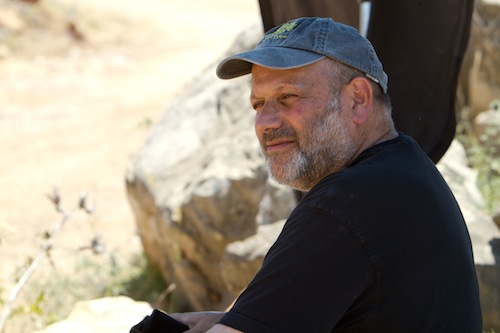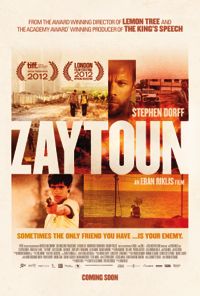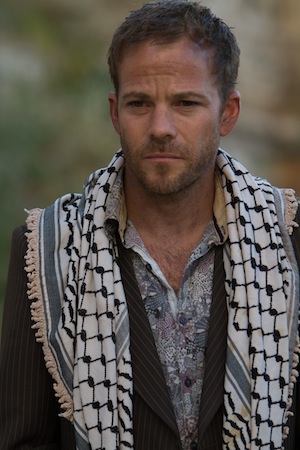

If you had the chance to make a film, would you choose to create one that unites and allows for a dialogue of cultures, or would you make one that divides, criticizes and creates further tension in our already shaky world? It would seem like a superfluous question, but the answer isn't so simple, as the headlines these days seem to prove. The undeniable fact is that negativity sells, the media jumps on scandals like flies on honey and many of us live -- and die -- by the old credo "the only bad press is no press at all."
And then there are those delightful breaths of fresh air like filmmaker Eran Riklis, whose beautifully crafted, touching films create within their audience a need to do better, to think better, to be better. I am not alone in my adoration of Riklis' films, as was proven when his latest, Zaytoun, was named as a runner up for the Audience Choice Award at this year's Toronto International Film Festival. The film will screen next at the BFI London Film Festival in October.
I caught up with Riklis in Toronto, inside a bustling hotel where the presence of film industry professionals was unavoidable. Yet the director granted an oasis of calm and thoughful consideration, the kind nearly impossible to achieve at press junkets and film festival interviews. In person, Riklis is kind, accepting and open to discuss all kinds of topics. And he is -- at the risk of sounding outrageously unprofessional -- endearingly cute. Yes, meeting Riklis changed the game for me, and will probably make every interview after this a bit anticlimactic.
On a Clear Day You Can See Damascus
 At the center of Riklis' latest film, Zaytoun (the Arabic word for "olive"), is a lesson in understanding. If we take the time to get to know those we call "them" in this world, it can help "us" be more at peace with all that appears foreign, incomprehensible and therefore scary. While a friendship between a newly orphaned Palestinian boy and a freshly captured Israeli air force pilot in 1982 Beirut may seem deeply unlikely, Zaytoun delves into what it would be like if this odd pair actually got to see the other's side of the story. I question Riklis about his own allegiance, or rather, his great ability to remain impartial. "For me you know it's strange, I was born and raised in Israel, but I was also raised in a lot of other countries, I grew up in the States as a kid, and then when I was a teenager I grew up in Brazil but went to an American high school." He continues, "And I lived in London for five years, so I have this kind of really global, universal education and exposure to things which were not necessarily part of every Israeli kid's life and I think for me what it did is it really opened me up." After studying film at Tel Aviv University and the National Film School in Beaconsfield, England, his first feature was the political thriller On a Clear Day You Can See Damascus, which he admits "was really subversive but it was a student film." He followed that with films like Cup Final, in his words "unique in a sense because it was a story about Palestinians, PLO guys that were totally human on the screen," and Zohar, a music biopic which was "a huge hit in Israel. It was in '93/'94 and people still remember that as a film of mine" -- Zohar was the biggest box office hit of the '90s in Israel. Then came The Syrian Bride, Lemon Tree and The Human Resources Manager, three films packing a punch with international audiences.
At the center of Riklis' latest film, Zaytoun (the Arabic word for "olive"), is a lesson in understanding. If we take the time to get to know those we call "them" in this world, it can help "us" be more at peace with all that appears foreign, incomprehensible and therefore scary. While a friendship between a newly orphaned Palestinian boy and a freshly captured Israeli air force pilot in 1982 Beirut may seem deeply unlikely, Zaytoun delves into what it would be like if this odd pair actually got to see the other's side of the story. I question Riklis about his own allegiance, or rather, his great ability to remain impartial. "For me you know it's strange, I was born and raised in Israel, but I was also raised in a lot of other countries, I grew up in the States as a kid, and then when I was a teenager I grew up in Brazil but went to an American high school." He continues, "And I lived in London for five years, so I have this kind of really global, universal education and exposure to things which were not necessarily part of every Israeli kid's life and I think for me what it did is it really opened me up." After studying film at Tel Aviv University and the National Film School in Beaconsfield, England, his first feature was the political thriller On a Clear Day You Can See Damascus, which he admits "was really subversive but it was a student film." He followed that with films like Cup Final, in his words "unique in a sense because it was a story about Palestinians, PLO guys that were totally human on the screen," and Zohar, a music biopic which was "a huge hit in Israel. It was in '93/'94 and people still remember that as a film of mine" -- Zohar was the biggest box office hit of the '90s in Israel. Then came The Syrian Bride, Lemon Tree and The Human Resources Manager, three films packing a punch with international audiences.
It's not a banner for the Palestinians, it's not a banner for the Israelis
Riklis admits that the topics he tackles in his films can create a "guttural response," and with Zaytoun, a story by Palestinian first-time screenwriter Nader Rizq, he's glad because "there is a need for Israelis and Jews around the world to actually deal with these issues and try to tackle them." He continues, "Of course they become hyper sensitive every time they are dealt with because you know if you put a Palestinian element in the foreground it immediately draws various opinions," but he infuses his work with "honesty, respect, compassion, passion and really try to stick to them as much as I can" which always manages to win his audiences over. "I don't feel like a martyr, let's put it this way," he says with a smile, and dispels any doubts that he may be "an underground director who does these kind of subversive films," choosing instead to create work that is "accessible, because I want an audience, otherwise why make the films?" With Zaytoun, his aim was to diffuse any "guttural reaction" -- almost like saying, in his words, "Hey hey, relax! It's a film, it's not a banner for anyone. It's not a banner for the Palestinians, it's not a banner for the Israelis, it's about people, whoever they are, they can be bad, they can be good, they can have whatever opinion they have but it's a reflection of reality."
I feel my films follow those codes that I have for myself
A question always on my mind is how do filmmakers who make a real impact begin to create their masterpieces. Can you really set out to make a film that will change the world, or will it end up being a self-indulgent bore if you do? Riklis is clear in his answer: "I'm not a fanatic but there are codes about how to portray people, how to portray emotions, how to portray politics -- and even then it's all about feelings in a strange way. So if I feel good about it, I feel confident about it, then I'll put it on the screen and then it's out there in the world." And about reaching an audience, he continues, "I assume that there are those people out there in the world who maybe think in a similar way or are at least open to thinking in similar ways. On the other hand there is a dissonance there, because it's almost like I don't want to impose anything on anyone." One of the best quotes about making films with a conscience did come from Riklis himself, at the premiere screening of Zaytoun at TIFF: "I want to take away the rage and make us rethink and reconsider; films can't change the world but they can make you think."
Stephen Dorff: Golden boy from California or Israeli fighter pilot?
 When the time came to cast Zaytoun, Riklis admits that having seen Stephen Dorff in Somewhere gave the filmmaker "another prospective on him," one different from his initial feeling of this handsome American actor from California. To those of us who have watched the film, it is impossible to imagine anyone else as Yoni, and Riklis made it his mission to "really take him, discover his sensibility and adapt him a little bit to being an Israeli... But he's an Israeli pilot, so it's different." He also confesses, "I didn't make my life easy in that sense, I didn't say, you are an American, your mother is American, forget that. No -- you were born and raised in Israel, you are a classic Israeli," and the rest was about Dorff "getting the accent right and getting his demeanor right." The end result, well, Riklin gushes, "I think Stephen did a great job; he was really believable; it was really beautiful, and I really liked his focus."
When the time came to cast Zaytoun, Riklis admits that having seen Stephen Dorff in Somewhere gave the filmmaker "another prospective on him," one different from his initial feeling of this handsome American actor from California. To those of us who have watched the film, it is impossible to imagine anyone else as Yoni, and Riklis made it his mission to "really take him, discover his sensibility and adapt him a little bit to being an Israeli... But he's an Israeli pilot, so it's different." He also confesses, "I didn't make my life easy in that sense, I didn't say, you are an American, your mother is American, forget that. No -- you were born and raised in Israel, you are a classic Israeli," and the rest was about Dorff "getting the accent right and getting his demeanor right." The end result, well, Riklin gushes, "I think Stephen did a great job; he was really believable; it was really beautiful, and I really liked his focus."
Eran Riklis, the Rockstar
It's hard to imagine a world without Riklis as a filmmaker, without his great films to keep us company and his even greater message of "hope, honestly, respect and a little bit of love" to help us through. Yet when I ask him what he would have been if he had not turned to filmmaking, Riklis says, "Musician, it's an easy answer!" At age 15, he admits, "I played a lot of instruments: guitar, piano, accordion, clarinet; and I left it all because filmmaking got into me." He ponders that perhaps a lot of filmmakers have musical tendencies because although "films have everything, image, sound, music, everything really, music is also everything." With a wink, he ends our interview, "Maybe I'll buy an electric guitar soon..."
Photos by Eitan Riklis, courtesy of Touchwood PR
